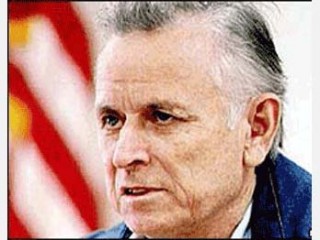
Ray, James Earl biography
Date of birth : 1928-03-10
Date of death : 1998-04-23
Birthplace : Alton, Illinois, USA
Nationality : American
Category : Famous Figures
Last modified : 2010-04-01
Credited as : assassin of Martin Luther King, American criminal,
0 votes so far
James Earl Ray came from a poor family in Alton, Illinois, and left school at age 15. He joined the US Army during World War II and served in Germany. In 1949, he was convicted of his first crime, a burglary in California.
In 1952 he served two years for armed robbery of a taxi driver in Illinois. In 1955, he was convicted of mail fraud. After an armed robbery in Missouri in 1959, Ray was sentenced to 20 years as a habitual offender. In 1967, he escaped by hiding in a truck transporting bread from the prison bakery.
Martin Luther King murder
On April 4, 1968, Martin Luther King was staying at the Lorraine Motel in Memphis. He was shot and killed by a sniper while standing on the motel's second-floor balcony.
Capture and trial
A little more than two months after King's death, on June 8, 1968, Ray was captured at London's Heathrow Airport while trying to leave the United Kingdom on a false Canadian passport. Alleged to have shot King, he was using the name of Ramon George Sneyd. At the airport, officials noticed that Ray carried another passport under a second name. The UK quickly extradited Ray to Tennessee and charged him with King's murder. He confessed to the crime on March 10, 1969. Although three days later Ray recanted his confession, he pled guilty and was sentenced to 99 years in prison. On the advice of his attorney, Percy Foreman, Ray took a guilty plea to avoid a potential trial conviction, which could have led to sentence of the death penalty. The method of execution in Tennessee would have been electrocution.
Ray fired Foreman as his attorney and from then on derisively called him "Percy Fourflusher". He claimed a man he met in Montreal, who used the alias "Raoul", had been deeply involved, as was his brother Johnny, but not himself. Ray further asserted that although he didn't "personally shoot Dr. King," he may have been "partially responsible without knowing it", hinting at a conspiracy. He spent the remainder of his life attempting unsuccessfully to withdraw his guilty plea and secure a trial.
Escape
On June 11, 1977, Ray made his second appearance on the FBI Most Wanted Fugitives list, this time as the 351st entry. He and six other convicts had escaped from Brushy Mountain State Penitentiary in Petros, Tennessee on June 10, 1977. They were recaptured on June 13, three days later, and returned to prison.
A year was added to Ray's previous sentence, to total 100 years. Shortly after, Ray testified that he did not shoot King to the House Select Committee on Assassinations.
Later developments
In 1997, King's son Dexter met with Ray, and publicly supported his efforts to obtain a retrial. Loyd Jowers, a restaurant owner in Memphis, was brought to civil court and sued as being part of a conspiracy to murder Martin Luther King. Jowers was found legally liable, and the King family was awarded $100 in restitution. The amount was to show they were not pursuing the case for financial gain.
Dr. William Pepper, a friend of King in the last year of his life, represented Ray in a televised mock trial to try to get him the trial he never had. Pepper next represented the King family in a wrongful death civil trial against Loyd Jowers. The King family has now concluded that Ray did not have anything to do with the murder of Martin Luther King.
Death
Ray died in prison on April 23, 1998, at the age of 70, from complications related to kidney disease and liver failure caused by hepatitis C. He probably contracted the disease by a blood transfusion given after a stabbing while at Brushy Mountain State Penitentiary. Ray was survived by seven brothers and sisters. His brother Jerry Ray told CNN that his brother did not want to be buried or have his final resting place in the United States because of "the way the government has treated him." Ray was cremated and his ashes were flown to Ireland, home of his family's ancestors.
















